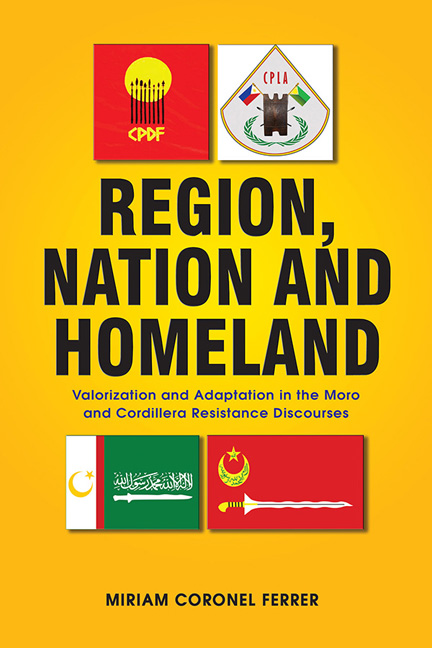 Region, Nation and Homeland
Region, Nation and Homeland Book contents
- Frontmatter
- Contents
- Preface
- List of Abbreviations
- Maps
- 1 Introduction: Text and Resistance
- 2 The Moro Liberation Movement: From Secession to Autonomy
- 3 The Cordillera Movement (1970s–2008): Building and Losing the Consensus
- 4 Nation, Homeland and Ancestral Domain: Intertextuality in the Moro Discourse
- 5 Identity Ambivalence in the Pan-Cordillera Discourse
- 6 Conclusion
- Bibliography
- Index
- About the Author
4 - Nation, Homeland and Ancestral Domain: Intertextuality in the Moro Discourse
Published online by Cambridge University Press: 02 April 2020
- Frontmatter
- Contents
- Preface
- List of Abbreviations
- Maps
- 1 Introduction: Text and Resistance
- 2 The Moro Liberation Movement: From Secession to Autonomy
- 3 The Cordillera Movement (1970s–2008): Building and Losing the Consensus
- 4 Nation, Homeland and Ancestral Domain: Intertextuality in the Moro Discourse
- 5 Identity Ambivalence in the Pan-Cordillera Discourse
- 6 Conclusion
- Bibliography
- Index
- About the Author
Summary
This analysis of the discursive practice of the Moro resistance movement uses the notion of intertextuality to illuminate discursive change as affected by and in turn affecting the social condition and politics of the Philippines. Intertextuality refers to how a text draws on other texts, such as by combining elements from different discourses. Such concrete language use “can change the individual discourses and thereby, also, the social and cultural world. By analyzing intertextuality, one can investigate both the reproduction of discourse whereby no new elements are introduced, and discursive change through new combinations of discourse.”
There are several ways to discern this intertextuality as practised by text producers-interpreters. Bakhtin differentiates between horizontal and vertical intertextuality. Of interest here is vertical intertextuality, which refers to intertextual relations between a text and other texts within it as they are historically linked within various timescales and along various parameters. In this regard, Fairclough introduced the related notion of interdiscursivity. In interdiscursivity, elements of orders of discourse, and not just other texts, are combined, resulting in heterogeneous texts. Heterogeneous texts may vary in the extent oftheir integration or accentuation of other discursive formations and practices. Consequently, intertextuality can be the source of much ambivalence in the texts. Such ambivalence has allowed our resistance entrepreneurs in this study to survive decades of protracted conflict and to overcome new global and domestic challenges and contexts.
Significantly, the producers of the resistance texts that will be examined here were part of a “chain of speech communication” or an “intertextual chain”. The “[d]iscourses and the texts which occur within them have histories, they belong to historical series.” They drew from existing discourses/texts and were influenced by dominant and alternative ideologies, paradigms and ideas that prevailed during their time, locally and globally. As competitors for leadership in the Moro ethnopolitical movement, they engaged each other and the state directly and indirectly in a power struggle, including the power to interpret and change social reality. They were interpreting and weaving texts as they simultaneously engaged in the acts of discourse production, membership base-building, and armed struggle. Put another way, their movement entrepreneurs used multiple positioning within their discourses to negotiate power relations. This dynamic process reflects the basic notion of critical discourse analysis that discourse is constituted by the social condition, as well as constitutive of society and its politics.
- Type
- Chapter
- Information
- Region, Nation and HomelandValorization and Adaptation in the Moro and Cordillera Resistance Discourses, pp. 97 - 150Publisher: ISEAS–Yusof Ishak InstitutePrint publication year: 2020
